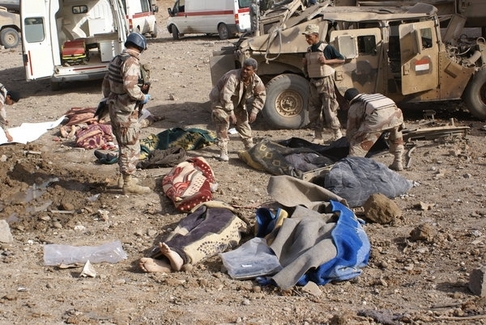I’m in full agreement with Bill Ardolino on the issue of whether the AP should have published the image of the US Marine who was gravely wounded in Helmand province, Afghanistan, and later died. The photo would not have been published here at The Long War Journal for the reasons he mentioned. Publishing the photo was a violation of the embed policy, for one. And ultimately, the AP should have deferred to the wishes of the family and the US Military.
As Bill noted, this is an extremely complex issue that the media has muddled further by politicizing US and Coalition casualties in Iraq and Afghanistan.
I, like Bill, have personally wrestled with a similar issue involving casualties of war. On Easter morning 2008, I was at the scene in the immediate aftermath of a massive suicide bombing at Combat Outpost Inman in Mosul, Iraq. As an embedded journalist, I was accompanying Brigadier General Taha Askar, the commander of the 2nd Brigade, 2nd Iraqi Army Division, and Lieutenant Colonel Jeff Meeker, the Military Transition Team leader for the Iraqi brigade. Based on the reports we heard before reaching the outpost, I knew the scene would be gruesome.
This was confirmed as soon as I exited the Humvee and began taking pictures. The massive suicide bomb – a dump truck packed with an estimated 10,000 pounds of explosives – had detonated right between three multi-story buildings, the force of the blast destroying their facades. Iraqi soldiers began laying out their dead brothers near the front of the outpost, wrapping them in the colorful blankets the soldiers used as bedding. Several of the Iraqi soldiers were clearly upset. Some were crying. Two began to yell at me.
I understood exactly how they felt. I felt like a vulture, picking over the carcass of the blast, hunting for the good photo. At that point I told Taha that some of the soldiers were clearly upset and that I wanted to respect his and their wishes.
Taha’s response was profound: “I want you to document what happened here today. I want you to show the world what these people [al Qaeda in Iraq] have done, how they are here to destroy Iraq.”
With Taha’s words, my doubts melted away. But had Taha asked me to put the camera down and not publish the photos, I would have understood and respected his wishes. As his guest, and as a decent human being, I owed it to him to respect his wishes and to respect the privacy of the fallen soldiers. The AP owed the fallen Marine’s family, and the US military, the same respect.
Are you a dedicated reader of FDD's Long War Journal? Has our research benefitted you or your team over the years? Support our independent reporting and analysis today by considering a one-time or monthly donation. Thanks for reading! You can make a tax-deductible donation here.








